“Observer Effect”
Written by Judith Reeves-Stevens & Garfield Reeves-Stevens
Directed by Mike Vejar
Season 4, Episode 11
Production episode 087
Original air date: January 21, 2005
Date: unknown
Captain’s star log. Reed and Mayweather are playing chess in the mess hall, but it soon becomes clear that it isn’t really them. They’ve been possessed by a couple of Organians, who have set up to observe this particular planet. They rather ominously say that someone always dies when they come here.
Tucker and Sato are returning to Enterprise in a shuttlepod when Tucker starts coughing uncontrollably and then collapses. He and Sato are taken to decon, and Sato starts coughing as soon as Tucker is settled in decon. They’re both quarantined until Phlox can figure out what’s going on—challenging that is that scanners aren’t picking up anything at all. None of the other landing parties showed any signs of being infected.
The two Organians discuss other species that have come to the planet, including Cardassians and Klingons. Both of the latter killed the patients—the Klingons before they ever came on board, the Cardassians after but before they could infect everyone else. One Organian points out that, while it’s true that the humans let the infected onto their ship, they kept them isolated.
The Organian possessing Mayweather goes to decon to ask Tucker and Sato how they’re feeling, but all he does is creep them out and they close the blind in the window. The one possessing Reed similarly questions Phlox on the pretext of going to sickbay for a headache, but Phlox assumes it’s because Reed is being overly cautious with regards to ship’s security and kicks him out.
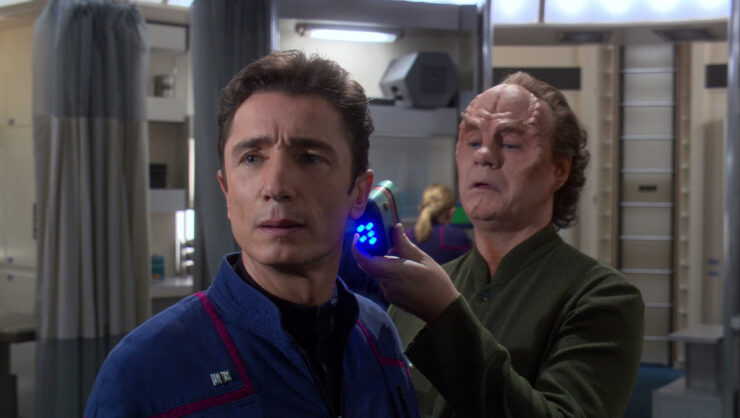
Phlox eventually figures out that it’s a silicon-based virus. Archer doesn’t see how that could’ve developed on an M-Class world, but Phlox theorizes that a meteor could’ve struck the surface carrying it. That would also explain why only one landing party contracted it. Unfortunately, there’s no match for it in any of the records, so Phlox is flying blind—and Tucker and Sato only have about five hours to live…
The Organians discuss the humans’ progress: They’re not abandoning the infected crew, which means they’ll probably all die. One Organian thinks that Archer is simply not bright enough to realize the danger they’re in, while the other believes that he’s showing loyalty and compassion. They switch to Phlox and T’Pol, as Archer’s decisions are based on their work (T’Pol is assisting Phlox in his search for a cure).
Buy the Book
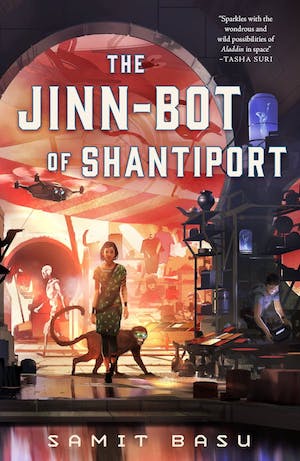

The Jinn Bot of Shantiport
Tucker and Sato are keeping each other occupied with stories about themselves. Each admits to being envious of the other’s talents. Sato also tells the story of how she got kicked out of Starfleet Training because she broke the arm of the training officer when he broke up their poker game. She wound up able to join Starfleet anyhow because they were in rather desperate need of linguists.
The Organians check on Tucker and Sato while possessing Phlox and T’Pol. After creeping out the patients some more, they return to sickbay where they see that the pair are making minimal progress. After the Organians return to Mayweather and Reed, Phlox and T’Pol—with no memory of having been possessed—see that their latest test has failed, but also there are indicators that ionizing radiation will destroy the virus. The problem is, the amount needed to eradicate it would kill a human. Still, it’s a start…
Enterprise detects a crater near where Tucker and Sato were on the surface, and it’s also near the Klingon dump site. It’s possible the Klingons also got the virus. Archer contacts Starfleet Command to try to get in touch with the Klingons through diplomatic channels, but they later discover the debris from a Klingon shuttle. Archer is guessing (correctly) that the Klingons just killed the patients.
Sato becomes delirious and is able to use her linguistic skills to break the code on the decon chamber lock and escape, all the while muttering in multiple languages. She makes it all the way to an airlock before Tucker talks her down and gets her back into decon. Phlox suggests sedating both of them.
Reed and Mayweather are on duty on the bridge, so the Organians are going about their usual duties. The one in Mayweather urges his colleague to cure the humans. They’ve made all the observations they need to, and they didn’t come here to watch people suffer. The Reed Organian disagrees. They can’t really have this discussion on the bridge, so they transfer to somewhere more private: the sedated forms of Tucker and Sato.
As their argument continues, Phlox notices that the patients are awake and talking, which is impossible given the amount of sedative they were given. He scans them and detects non-human brainwave patterns superimposed over those of Tucker and Sato. Once the Organians realize they’ve been seen, they leave the patients and transfer to Archer and T’Pol and confront Phlox. They explain that they’re observing how the virus affects the visitors to this planet. Phlox is disgusted at their callousness toward their subjects, and also at how blithely they alter people’s memories (since nobody remembers being possessed—the Archer Organian comments that memories are ridiculously easy for them to manipulate).
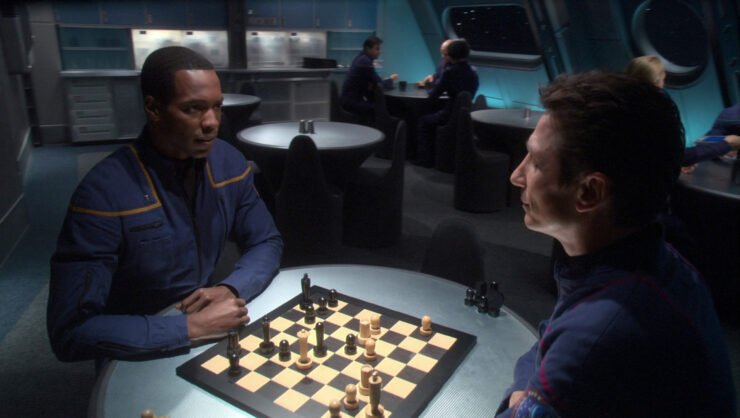
The Organians continue to discuss the matter. The cure that Phlox is working on is one that others have developed—but not until after the infected die. The senior Organian (the one who’s been in Reed most of the time) is unimpressed with the humans and doesn’t think they’re any more special than the ones who developed the cure too late. The younger one (who’s been mostly in Mayweather) disagrees.
Phlox can modulate the radiation enough not to kill the patients, but only if he uses the medical scanner in sickbay. They expand the quarantine zone to include sickbay and the corridors between it and decon. Phlox and Archer get into EVA suits and bring the pair from decon to sickbay. Unfortunately, Sato goes into cardiac arrest. They can’t use the equipment to revive her in EVA suits, but Archer won’t let Phlox expose himself, as they need a doctor right now more than a captain, so he removes his gloves and follows Phlox’s directions.
Alas, their heroic efforts aren’t heroic enough, as both Tucker and Sato die—and now Archer, too, is infected. As the Reed Organian said at the beginning of the episode, someone always dies.
However, the younger Organian decides to tell Archer what’s going on by possessing Tucker’s corpse. The other Organian angrily possesses Sato’s corpse to try to stop him. Archer gives a very high-handed (but justified) speech about how morally depraved it is to know that there’s a deadly virus on a planet and not tell anyone about it. Archer’s plea for compassion convinces the Organians to cure all three of them—since they got their observational findings either way—and they do so, but also erase Archer’s memories of the Organians themselves. The two, back in in Reed and Mayweather, agree that this particular test is no longer feasible, and that they should prepare for first contact with humans in five thousand years or so…
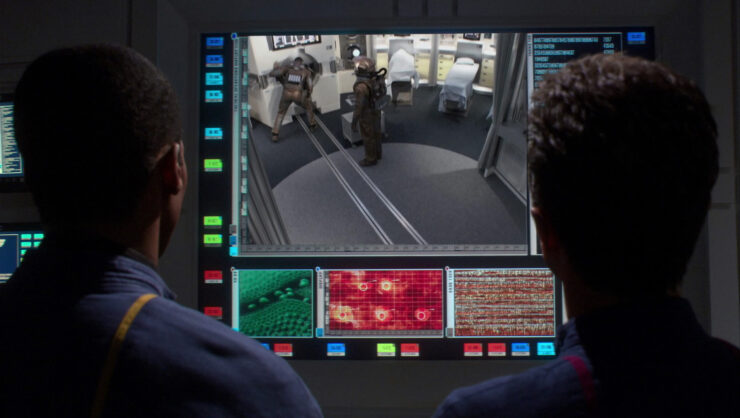
Can’t we just reverse the polarity? Archer leaves a warning buoy on the planet so that future folks won’t get infected, and you’re telling me nobody else ever did that before?????
The gazelle speech. Archer sacrifices himself to try to save Tucker and Sato. He is also surprisingly unaffected by the corpse of his best friend sitting up and talking to him…
I’ve been trained to tolerate offensive situations. T’Pol assists Phlox in his search for a cure, and she’s the one who first notices that ionizing radiation may be the key.
Florida Man. Florida Man Gets Sick, Dies, Becomes a Zombie, Is Resurrected, Remembers Almost None of It.
Optimism, Captain! Phlox is absolutely disgusted by the Organians’ behavior, and isn’t shy about expressing it.
Qapla’! Tucker and Sato had the unenviable task of going through Klingon garbage. The Klingons who last visited the world also had some of their crew succumb to the virus, but the Klingons just kept them on their shuttle and blew it up.
More on this later… The Organians will later be seen in the original series’ “Errand of Mercy” to be trying to avoid the Federation-Klingon conflict by pretending to be peaceful colonists on a world desired by both sides in their war. Eventually, they reveal themselves and force the war to stop.
I’ve got faith…
“You ever see The Andromeda Strain?”
“Strain of what?”
“No, it’s a movie, mid-twentieth century.”
“Let me guess—Dr. Andromeda builds a monster and it kills him in the end?”
“It’s about an extraterrestrial disease.”
“All your movies are the same—I can’t keep the stories straight.”
— Tucker and Sato killing time while waiting to die.
Welcome aboard. No guest stars in this one. However, every member of the opening-credits cast does double duty as one of the Organians, with Dominic Keating, Jolene Blalock, and Linda Park playing the senior Organian and Anthony Montgomery, Scott Bakula, Connor Trinneer, and John Billingsley playing the junior.
Trivial matters: The Organians have also been seen in various works of tie-in fiction, among them the novels Spock Must Die! by James Blish, Trek to Madworld by Stephen Goldin, The Buried Age by regular commenter Christopher L. Bennett, The Romulan Way by Diane Duane & Peter Morwood, and the Q-Continuum trilogy by Greg Cox; the short story “Reflections” by Dayton Ward in Strange New Worlds; the comic books Year Four: The Enterprise Experiment #1-5 by D.C. Fontana, Derek Chester, and Gordon Purcell (IDW), The Q Conflict #1-6 by Scott & David Tipton and David Messina (IDW), Deep Space Nine: Blood and Honor by Mark Lenard, Leonard Kirk, Ken Penders, and Terry Pallot (Malibu), Star Trek #1-4 by Mike W. Barr, Tom Sutton, and Ricardo Villagran (DC), and Star Trek #13 by Len Wein & Alberto Giolitti (Gold Key); and the RPG module All Our Yesterdays: The Time Travel Sourcebook (Last Unicorn).
Tucker references the movie version of The Andromeda Strain, which was directed by Robert Wise, who also directed The Motion Picture. The image of the virus is also of the same hexagonal design as the one in that movie. Tucker claims it’s “mid-twentieth century,” which is not exactly true, as it came out in 1971, and he also completely fails to mention that it was a novel first, written by Michael Crichton.
Sato speaks, at various points, German, Russian, Spanish, Japanese, French, Turkish, Arabic, and Klingon. It’s also established in this episode that Sato is a black belt in aikido.
The Organians mention the Cardassians, who were also seen in “Dead Stop,” though there has been no formal contact between them and humans yet.

It’s been a long road… “How many have to die before you admit humans are different?” In physics, the observer effect is the notion that the act of observing something still can affect and change it. That’s the theme of the episode, though the fact that neither Phlox nor Archer pointed this out to the Organians when they were talking to them is a rather major omission. Indeed, their presence affected the events of the episode, however subtly, which is something you’d think an advanced lifeform would notice…
Also, this entire episode is based on a misreading of “Errand of Mercy.” The Organians basically were hiding from the humans and Klingons and hoping they’d go away quickly and leave them alone. They only stopped the war when it became clear they wouldn’t go anywhere. They came out and said that mortal forms were disgusting to them and would you go away, please?
So to see them running tests on corporeal mortals is at odds with the get-off-my-lawn, not-in-my-backyard mien they showed in “Errand of Mercy.” Still, this could be a different faction of Organians from Ayelborne, Claymare, and Trefayne.
In any case, this episode is perfectly fine. It’s a good use of the bottle-show format, using the Organians’ non-corporeality to save money on guest stars by having them possess the crew. It’s to the credit of all the actors and to director Mike Vejar that you can tell every single time someone is possessed, from the very first scene when Reed and Mayweather don’t sound at all like themselves. Even better, you can always tell which one is the hidebound older Organian and which is the questioning younger one.
Points also to this episode for reminding us that Sato is something of a badass, what with her aikido black belt, her having been kicked out of Starfleet training, and her ability to break the ship’s lockout codes. Thought it’s also kind of sad that it took until the show’s 86th episode to get this stuff.
One of the episode’s biggest flaws is the ending. I simply didn’t buy that Archer’s speech was sufficient to convince the elder Organian to let the younger one have his way. John Billingsley’s outrage in the earlier scene when the Organians reveal themselves to him is far more compelling and convincing than Scott Bakula’s somnabulant speechifying. He practically might as well have said, “They’re in the opening credits, they can’t die!” which would have been about as convincing…
Warp factor rating: 6
Keith R.A. DeCandido will be a guest at Anime Banzai at the Davis Conference Center in Layton, Utah this weekend, alongside Star Trek: Prodigy voice actor Bonnie Gordon, as well as a bunch of voice actors and artists and writers and cosplayers and performers. He’ll have a table where he’ll be signing and selling books, and also will be doing some programming. His full schedule is here.










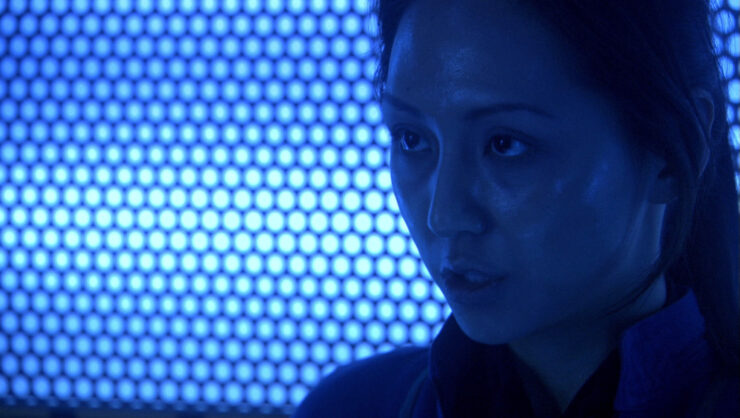
A pretty good classic-Trek-style story, though I agree these aliens absolutely should not have been Organians. Gene Coon’s script for “Errand of Mercy” stressed six ways from Sunday that the Organians were complete isolationists who found the presence of corporeal beings to be distressing and repugnant. This was done because episodic TV in the ’60s was supposed to avoid continuity and Coon needed to pre-load the episode with an explanation for why the Organians would never intervene in Federation affairs again. So the idea of Organians traveling beyond their homeworld and actively studying corporeal beings — even possessing their bodies — is completely misunderstanding the species. It’s taking their name and applying it to something totally different. It’s just gratuitous, a continuity hit for the sake of a continuity hit, and one that breaks continuity in the process. They could’ve given them a different name and it would’ve changed nothing.
I tried to gloss this over in The Buried Age by referring to these Organians as a breakaway group that the mainstream Organians were scandalized by. But it should never have been necessary in the first place. I wish more Trek writers would resist the impulse to limit themselves to things that were encountered in previous Trek series. It’s a vast universe — fill it with new stuff!
It’s also a bit odd that this episode takes a “humans are exceptional” stance, when the same authors’ previous “The Forge” opened with Admiral Forrest’s speech that nicely refuted the idea of human exceptionalism. Soval speaks of the other races in terms of stereotyped traits, and Forrest resists that, insisting that you could find the whole range of attributes in all the different sapient species. And Soval admits that the real reason the Vulcans find humans so alarming… is because we remind them of themselves. Which neatly undercuts the conceit of humans having special qualities that Vulcans lack.
“We’re being observed.”
My opinion of this episode has been coloured in the past by a rather obnoxious review in a UK genre mag that basically said “This is what Star Trek’s supposed to be about: Humans being better than everyone else.” That might be how a lot of fans see it, and probably Gene Rodenberry in his later years, but it’s not a viewpoint I’m comfortable with.
But I managed to put that aside and was surprised to find the episode very enjoyable. It’s the bottlest of bottle episodes, with no new sets, no speaking characters apart from the regulars and just a few simple model shots, but like ‘Shuttlepod One’ in the first season, these limitations lead to some good character work for the cast. It has one of the show’s best pre-credits, a wonderfully creepy scene as we slowly realise that Reed and Mayweather aren’t themselves. The aliens (not identified until their conversation with Archer) never quite lose that creepiness, unable to grasp the basics of human and humanoid behaviour and lucky that everyone’s too worried to notice.
Tucker and Sato spend a good chunk of the episode ill and dying, which doesn’t really serve them that well despite Sato’s story of her wild past. We know they’re going to be all right but the final scenes are tense, with Archer showing just how committed he is to his crew and thankfully hammering another nail in the coffin of the whole “The captain is the most valuable person on the ship” nonsense. T’Pol shows some wonderfully underplayed pain at the prospect of losing the two men that mean the most to her. The reveal the aliens are Organians is rather unnecessary and it might have been best for them to stay unknown and unknowable, but at least Archer does a better job of lecturing them than Kirk will!
Unfortunately, I have to agree that the episode’s biggest logic flaw is at the end, where Archer is apparently the first person in 10,000 years to think of setting up a warning buoy. I wondered if the Organians have been getting rid of any warnings, but no, Fake Reed says that’s an end to the experiment. (Then again, after the nonsensical quarantine back in ‘Extinction’, maybe humans actually are the first species to think of warning buoys!)
Reed (or rather the Organian possessing him) briefly mans communications in Sato’s absence.
What bugs me about this one is that, even if they wanted to reference prior canon, almost any other group of non-corporeal aliens would have worked better than the Organians. The Metrons, the Ux-Mal, whoever impregnanted Troi; even the Q or the Prophets.
@3/jaime: The Metrons aren’t non-corporeal. There isn’t anything in “Arena” that suggests they are; the Metron Kirk meets only says that he’s 1500 years old despite looking like a boy (Kirk’s word). The only reasons people assume they’re non-corporeal are, 1) Carole Shelyne’s sparkly toga caused reflections in the camera lens that many viewers mistook for a shimmer of energy, and 2) people tend to assume that all advanced aliens are equally advanced, so if some are energy beings, they all have to be.
I really wanted to like this episode but it shows one of the things that made me not enjoy the series. Waiting until the fourth season to dialog drop that Sato is a black belt in aikido when it would have been better to show her maybe in the gym practicing and or bringing the subject up in earlier seasons. Being a black belt should have been a nice bit to expand on her character.
Admitedly, the black belt in aikido seems like it should have come up when the Suliban took over the ship, or when she was abducted by the Xindi. Probably other times, too.
This episode had a plot that felt more contrived than believable. Definitely not a favorite of mine.
jaimebabb: Aikido is a more defensive art than offensive, and certainly when she was abducted by the Xindi, she was transported and then drugged. She wouldn’t have had the opportunity.
Speaking as a black belt in karate, trust me, it’s not any kind of be-all and end-all for being able to hold your own in a fight. Hand-to-hand combat is a difficult and chaotic thing, even when you know what you’re doing.
—Keith R.A. DeCandido
I’m torn over whether establishing that Hoshi knows aikido was 1) giving into a lazy Asian stereotype or 2) finally, finally giving some trace of Japanese cultural background to a character allegedly native to Kyoto but written and performed indistinguishably from an American. While it’s true that American media have a tendency to assume all Japanese people are martial artists (much like how Japanese fiction tends to assume all Americans are cowboys), it’s also true that martial arts are pretty prominent in Japanese culture, e.g. sumo being the national sport.
What crosses my mind is that I don’t recall Sato showing much aptitude when Hayes was giving the senior staff combat training, but I should probably watch that scene again to see if there’s anything subtle or ambiguous that I missed.
There’s this tendency to remember things when they’re at their end, and not recall what they were before they made the one decision that colored their whole being. I mostly remember the Organians for being the aliens who meddled with the Starfleet/Klingon conflict on “Errand of Mercy”. It can be easy to overlook the fact that they were isolatonists in the first place. I myself originally took that wrong impression from the Organians. Much like the Reeves-Stevenses, Manny Coto and company, it seems. Which is one of the reasons I had less of a problem with this episode and didn’t realize the inconsistency until I read this rewatch today.
Still, it’s a damn good bottle show that makes excellent use of the cast in these possessed roles. Vejar and the cast really step up their game and make for some compelling scenes. In its core, it’s a classic Trekkian story about learning from other cultures and cultivating empathy. If they created another alien species in place of the Organians, this would have been an easy 9 or 10.
Yeah I didn’t particularly like this episode, or the portrayal of the Organians here. The aliens who froze every console on a fleet of starships to stop a war don’t seem like the type who would let people die of a virus that they could help with right in front of them. These Organians remind me more of the Srivani from Voyager’s “Scientific Method”, with their inability to see the lives of their subjects as valuable.
The acting was excellent though.
@12/mr_d: “The aliens who froze every console on a fleet of starships to stop a war don’t seem like the type who would let people die of a virus that they could help with right in front of them.”
Not really. The Organians didn’t stop the war out of benevolence or activism, they just wanted to get the noisy kids off their lawn. If the war hadn’t come to Organia itself, the Organians wouldn’t have bothered to intervene, because they found it loathsome to interact with corporeal beings. That’s why they didn’t intervene with any of the other wars and catastrophes we’ve seen in Trek. Their motives in “Errand” were purely selfish.
I enjoyed this one. Good acting by all as portraying aliens possessing their bodies. Also, the “deaths” of Sato and Trip here were far more touching and emotional than with the handling of something significant happening to a certain main credits character in the series finale.
@Krad/Trivial Matters: Wow, that’s a lot of stuff! Perhaps you should have listed all the things the Organians weren’t in instead
This episode implies that the Organians have to possess corporeal beings to communicate with each other (as seen in their move from Reed and Mayweather on the bridge to Tucker and Sato in sickbay), which doesn’t make much sense.